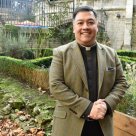“Even now, many years later, I still ask myself, ‘was it really abuse?’ I always hoped he’d hit me because then I’d definitely know it was abuse.
Sarah*, a member of one of the worshipping communities in this diocese, spoke about the ordeal she went through in a marriage where coercive control was part of everyday life.
Coercive control is an act or pattern of acts of assault, threats, humiliation and intimidation or other abuse that is used to harm, punish, or frighten their victim.
Sarah said, “The kind of coercive control I experienced was so subtle that I doubted myself. For a long time, I wondered if my husband might be neurodiverse and wondered whether if he had a diagnosis, it might have been easier to live with. But years down the line, I was deleting some emails and realised, ‘No that’s just plain horrible!’ The nature of coercive control is that you never have any time to think because you are never given any space.
“Being a victim of gaslighting (manipulating someone so that they question their reality) has left me struggling to trust my own judgement. I am still reality-testing. One of the most helpful things that the Church safeguarding team did for me, was to make it clear that what I was experiencing was not normal.”
It was Sarah’s second marriage, and she was determined to be accommodating and forgiving to her husband, despite the challenging and manipulative behaviour he displayed from the start.
She said, “Within a week or two of marrying him, my husband was threatening me – ‘If you step out of line, I’ll divorce you’.
“The sanctity of marriage in a Church context is really important. After a time, I was being really honest and saying to people around me, my marriage is atrocious. I am not sure whether I am going to survive this. If I’m honest, I was waiting for him to die. I’d been married before and I didn’t want to get divorced again.
“I can remember talking to a Christian friend who would always encourage me to forgive. She would say, ‘This is God’s work, this isn’t something for you to do.’ When she later experienced my husband first-hand, she was shocked at how he treated me. None of the behaviours alone seemed unreasonable, but when you put them together you get the bigger picture.
“My friend said to me recently, ‘I’ll never forgive myself for not really understanding what you were going through. I think in a Church context the default is to really support marriage. That’s what we believe in. The danger is that we may not listen to people who are really struggling, especially as it’s normal for women to moan about their husbands.”
“I feel we need to work on listening really well to people when they explain the troubles they are experiencing.
I eventually had a conversation with a trusted Church leader, who said to me ‘What you are describing is an abusive relationship’. I burst into tears and said, ‘Oh, is it? I thought it was hard.’ From that point on, the support from the Church was extraordinary.
“The most helpful thing was people saying, ‘This isn’t normal!’. I remember my cry in those last few weeks before I left, was ‘This is not normal!’. You lose any sense of what is normal. It’s like the frog in the cold water that’s slowly heating, who doesn’t know that it needs to get out. This is years and years of quiet accommodation. It’s like a piece of metal – you bend, you bend, you bend, you bend, you bend, you bend… and then you think, ‘if I bend one more time, the metal will break’. I found I got to the choice where it was either me or the marriage.”
Sarah left her home, pretending she was going away for a business trip, leaving her beloved cat behind. Her husband never once rang to ask where she was. It was only later that she realised her husband was tracking her phone and had no need to ask where she was.
“You might be tempted to put up with an unacceptable situation for yourself but if you have children, you need to think about them. The long-term effects it has on them will be just as awful. You can’t really impose that on your kids. My children are in therapy, and I still really react to anything that feels slightly controlling, but that actually might be quite reasonable. I notice myself still accommodating, especially to domineering men in my life. I’ve got slightly better at standing up to them, but I have a feeling of sickness in my stomach. I guess some of that’s normal. It’s difficult to know what’s normal and what’s an overreaction because of my history.
“The long-term effect of abuse is paranoia. I always keep all my doors and windows locked, even to this day. I would never leave a window open. My cat disappeared the other night and my first thought was, gosh, has he come to steal the cat?
“I think the sad thing is, people in our parishes don’t think domestic abuse happens in our middle-class churches.
“The irony is that one profile of an abuser is somebody absolutely charming – so those very charming people on our PCCs or the husbands or wives of people on our PCCs might be the very people who are giving their families hell at home.
“People need to realise – an abusive marriage is not necessarily one where you have to call the police because you can hear loud rows; it can be this more subtle stuff. Doing domestic abuse training can help to open people’s eyes.
“Most of the people I know at church are very hacked off with the idea of having to complete safeguarding training, but once they have done it, they say it was helpful.
“After being in a knowing domestic abuse situation (I would not have admitted it to myself at the time as it felt normal), I did a lot of training. I found that helpful in educating myself to recognise things as abusive and not just having to accommodate strange behaviours.”
There are two ways of accessing domestic abuse training:
- You can access the Church of England’s Domestic Abuse Training here through the Church of England’s Safeguarding Portal https://safeguardingtraining.cofeportal.org/
- You can find the dates of the next diocesan Domestic Abuse Training on our events calendar –>
If you are a survivor of domestic abuse or would like support around this issue, please contact Becca Faal at ku.gr1713563964o.coi1713563964dsolg1713563964@laaf1713563964acceb1713563964 We can issue an exemption for this course.
If you would like to access specialist support from outside the Diocese of Gloucester via another agency, you can get in contact with GDASS.
*Names have been changed to protect identities.


















Thanks for sharing Sarah, so glad you found freedom from the abuse.